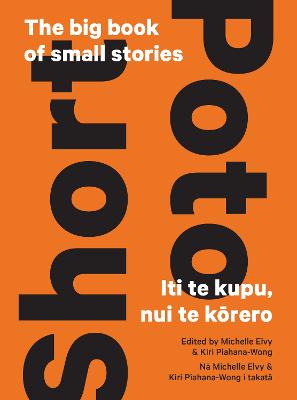Review: Short | Poto
'The bilingual presentation creates a unique reading experience. Stories appear numerically from 1-100, side by side in both languages, allowing readers to compare versions and discover how meaning shifts between them...'
Some books change how we read. Others change how we think about language itself. Short | Poto: The Big Book of Small Stories, published by Massey University Press, accomplishes both, presenting 100 flash fiction pieces in English and te reo Māori to create one of New Zealand's first truly bilingual literary anthologies. The subtitle Iti te kupu, nui te kōrero (small words, big stories) perfectly captures the collection's philosophy, that brevity can contain entire worlds, and that every language deserves equal literary space.
Editors Michelle Elvy and Kiri Piahana-Wong emphasise that ’every word has to serve a purpose’ in these stories under 300 words. Elvy, a short fiction specialist and founding editor of Flash Frontier, brings deep expertise in the form, whilst Piahana-Wong, a poet and editor, contributes essential knowledge of te reo Māori and indigenous perspectives. Their collaboration required a team of 10 translators working closely with individual authors to capture not just words but the intended essence of each narrative.
The collection addresses key themes defining contemporary New Zealand experiences: relationships, loss, mental health, and diverse perspectives. Environmental anxiety permeates many pieces, reflecting urgent concerns about climate change and ecological destruction. Stories explore cultural identity complexities, particularly for immigrants and mixed-heritage individuals navigating belonging. Intergenerational relationships feature prominently, examining how cultural knowledge and trauma transmit across families.
The bilingual presentation creates a unique reading experience. Stories appear numerically from 1-100, side by side in both languages, allowing readers to compare versions and discover how meaning shifts between them. This format serves multiple purposes: entertainment, language education, and cultural bridge-building.
Short | Poto features established writers like Owen Marshall, Vincent O'Sullivan, Tina Makereti, and Tusiata Avia alongside emerging voices, showcasing the diversity of Aotearoa through an array of lived experiences.
Mohamed Hassan's ‘When they ask you where you are really from’ is a powerful meditation on immigrant identity and the inadequacy of simple answers to complex questions of belonging. Hassan offers rich, sensory alternatives to the reductive ‘where are you really from’ question that many immigrants face. He weaves together intimate domestic memories of his ‘grandmother's laugh’, ‘cardamom’ and ‘cumin’, ‘fried shrimp’ and ‘voodoo dolls’, with broader themes of displacement, colonial history, and cultural survival, capturing the immigrant experience of existing between worlds with multiple identities that resist easy categorisation.
Steph Matuku's ‘Generation brutal’ captures the complex dynamics of intergenerational communication through a father's fascination with his daughter's evolving language. Matuku explores how slang becomes both a barrier and a stepping stone between generations, with the narrator simultaneously drawn to and excluded from his daughter's linguistic world. The story's strength lies in its honest portrayal of how language shapes identity and belonging. The daughter's dialogue ‘You need to stick to words of your generation…They're for you. And my words are for us’ highlights the inevitable drift between parent and child.
Ben Brown's ‘Bro story’ captures the complexity of Māori identity and belonging through a seemingly casual bar conversation. Brown uses the repetitive rhythm of ‘bro’ to create both intimacy and distance, exploring the weight of identity questions that seem simple on the surface but require deep introspection. The difference between being born with mana and keeping it, between shared whakapapa and lived experience. The conversational tone masks profound themes about cultural authenticity, spiritual inheritance, and the ongoing work of maintaining one's connection to whenua and wairua. The speaker's need to ‘investigate,’ ‘search,’ and ‘pick that scab’ reveals how identity isn't a fixed answer but an ongoing process of self-examination. It's a nuanced work that finds depth in everyday dialogue, showing how questions of belonging persist even among those who share cultural heritage.
These examples demonstrate the collection's capacity to address contemporary concerns through distinctly New Zealand perspectives. The work succeeds as both entertainment and language learning resource, fulfilling the editors' intention that readers who want to improve their te reo Māori will find ‘a unique and interesting way to practise their language skills’ and ‘a possible way to share and learn language in schools... and ignite curiosity in readers of all ages.’ Rather than traditional exercises, readers encounter te reo Māori through narratives about recognisable characters, emotions, and situations. Vocabulary emerges naturally from context, making learning organic rather than forced.
What differentiates this anthology from others is its treatment of both languages as equal partners in storytelling. While works by Pākehā writers already appear in te reo Māori, and Māori stories can also sit naturally in English, this collection demonstrates that all New Zealand narratives can be expressed in both languages, transcending typical anthology format to become a model for how New Zealand literature might evolve towards genuine biculturalism. Reviewed by Savannah Patterson
